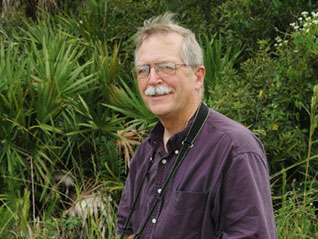
Photographed by Bette Jackson
If you are have difficulty playing the audio click here
Source: Baby Birds 3
Length of Segment: 00:01:15
Hi, I'm Dr. Jerry Jackson, out with the wild things. When a baby songbird hatches, it emerges from the egg pink and helpless, totally dependent on its parents for food, warmth, and protection. Such baby birds are referred to as being altricial: A-L-T-R-I-C-I-A-L. They may start out helpless, but growing rapidly and within a little over two weeks, most can leave the nest. That initial helplessness, however, requires parents to provide much care and an abundance of the right food. While birds such as northern cardinals normally eat seeds as adults, they and most songbirds provide their young with insects. The high protein content of insects and the ease with which insects can be digested help baby birds grow quickly. Parent birds are kept very busy, often making ten to fifteen feeding trips to the nest in an hour. But the rate of feeding is not constant during the day. Just as human parents need a break sometimes, adult birds must find food for themselves too. However, early morning is crucial to altricial babies. After going all night without food, young must be fed quickly in the morning, and then the adults get a break.
'With the Wild Things' is produced at the Whitaker Center in the College of Arts and Sciences at Florida Gulf Coast University. For 'The Wild Things', I'm Dr. Jerry Jackson.
< Back to Baby Birds
Length of Segment: 00:01:15
Hi, I'm Dr. Jerry Jackson, out with the wild things. When a baby songbird hatches, it emerges from the egg pink and helpless, totally dependent on its parents for food, warmth, and protection. Such baby birds are referred to as being altricial: A-L-T-R-I-C-I-A-L. They may start out helpless, but growing rapidly and within a little over two weeks, most can leave the nest. That initial helplessness, however, requires parents to provide much care and an abundance of the right food. While birds such as northern cardinals normally eat seeds as adults, they and most songbirds provide their young with insects. The high protein content of insects and the ease with which insects can be digested help baby birds grow quickly. Parent birds are kept very busy, often making ten to fifteen feeding trips to the nest in an hour. But the rate of feeding is not constant during the day. Just as human parents need a break sometimes, adult birds must find food for themselves too. However, early morning is crucial to altricial babies. After going all night without food, young must be fed quickly in the morning, and then the adults get a break.
'With the Wild Things' is produced at the Whitaker Center in the College of Arts and Sciences at Florida Gulf Coast University. For 'The Wild Things', I'm Dr. Jerry Jackson.
< Back to Baby Birds
These recordings are copyright 2007 by WGCU Public Media. They are being made available in the PALMM Digital Library with the express permission of the rights holder.
For permissions please contact the owning institution. WGCU Public Media, 10501 FGCU Blvd. S., Fort Myers, FL 33965
For permissions please contact the owning institution. WGCU Public Media, 10501 FGCU Blvd. S., Fort Myers, FL 33965




